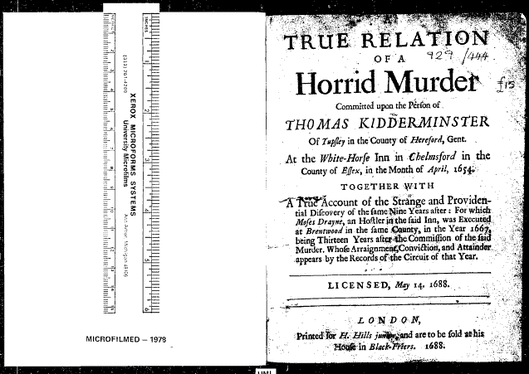 Date: 1688 Reel position: Wing / 853:61 Fans of Sherlock Holmes may be intrigued to know that the first known female sleuth in England was Anne Kidderminster (nee Holmes), a seventeenth-century widow who tracked down and brought her husband’s murderer to justice thirteen years after the crime. To find out more, check out my guest blog over on Criminal Element, found under the excerpt of A Murder at Rosamund's Gate.
1 Comment
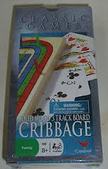 So my son recently received a cribbage game--a game I didn't know too much about but which looked fun enough. When we started to play, however, I happened to read this blurb on the packaging: "Cribbage is believed to have been invented during the 17th century by an English poet." What? Whoa! Cribbage is a 17th century game? Invented by a poet? What poet?! I had to look into this. So, of course, I typed in "History of Cribbage" into the almighty Google, and sure enough I found that "Cribbage was invented in the early 1600s by Sir John Suckling, an English courtier, poet, gamester and gambler." But since I tend not to believe what I read on the internet, I double-checked this information with the well-regarded Dictionary of National Biography. The DNB confirms the circumstantial evidence concerning the invention of the game, citing the biography of Suckling (1609-1641?), written by 17th century antiquarian John Aubrey (1626-1697) in his collection called Brief Lives. 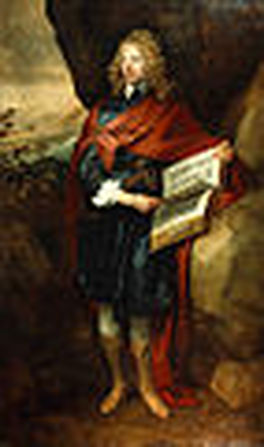 Sir John Suckling -Courtier & Cribbage Creator Aubrey portrays Suckling as quite a merrymaker, anecdotally recalling him as "the greatest gallant of his time" (287). Suckling was, too, alleged to be the "greatest gamester, both for bowling and for cards." He had such a reputation for gambling, it would seem, that "no shopkeeper would trust him for 6d, as today he might by winning, be worth 200 pounds, and the next day he might not be worth half so much" (287-291). Surprisingly, Suckling wasn't actually very good at cards...a bit of a problem for a compulsive gambler. To make up for this deficit, he would "by himself abed, and there studyed how the best way of managing the cards could be." Indeed, he figured out a variation of an existing game--Noddy--which he called "cribbage." Apparently others liked cribbage as well, and he came to make a lot of money off of his reinvention. As Aubrey tells us: "Sir John Suckling invented the game of Cribbidge. He sent his Cards to all Gameing places in the countrey, which were marked with private markes of his; he gott twenty thousand pounds by this way." However, Suckling had a weakness for "Ladies of Quality, all beauties and young." This weakness ended up costing him "many hundreds of pounds," apparently because he enjoyed lavishing them with "silk stockings, garters and gloves." (Brief Lives, 289).
Fun guy, to be sure! Suckling, however, was more than a courtier and a ladies' man. He found time to write--quite prodigiously--and demonstrated some fine insights into the larger political context of the day. All told, he wrote seventy-eight poems, four plays, a few political tracts, as well as at least fifty letters, which according to Aubrey, displayed great intelligence and a "sparkling wit." (287-291) It's actually interesting to consider Suckling's personality when you reflect on the game. After all, cribbage offers a funny balance of strategy and luck, as well as a carefree leapfrog quality. Suckling's dual love of gambling and carousing at play? Just a thought. Eventually, his bad luck at gambling and in love seem to have caught up with him. Sadly, at age 28, when faced with great financial losses, Suckling poisoned himself, "which killed him miserably with vomiting" (291). A sad end...but at least he gave us cribbage. We think. 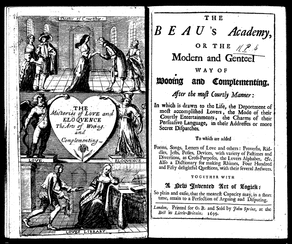 The beau's academy, 1699 Wing / 2854:35 In honor of the new year, I thought I'd offer some words of wisdom from the late 17th century. Granted, these words came from Edward Phillips, The beau's academy, or, The modern and genteel way of wooing and complementing after the most courtly manner (1699). So basically a book on how to be witty with the ladies. I selected a few of Phillips' -er- wisest statements and accompanying commentary (although a few are a tad hard to understand).
On prudent spending: He that spends beyond his ability, may hang himself with great agility. For he is lighter than he was by many a pound. (I have to say, this is one of Phillips' more sensical statements!) On the perils of whispering sweet nothings: Good words cost nothing. Unless it be love verses, for some men do pay. On fighting: He that cannot fight let him run. Tis a notable piece of Machiavelian policy. (I'm envisioning some poor battle-shocked Redcoats being relieved of their weapons and released to the elements....Machiavelian indeed!) On cooking: Better no pies, than pies made with scabby hands. (um, definitely one to keep in mind!) He's an ill cook that licks not his own fingers. (Methinks Tom Colicchio would concur!!!) On being a good provider: Good at meat, good at work. Therefore, 'tis the best way always to eat stoutly in the presence of women. (Got that, men?) ...and a few I can't easily categorize, but which sound a little naughty: Of idleness, comes no goodness. For that is the reason so many maids have the green sickness. (The "green sickness" [chlorosis or hypochromic anemia] was once considered "pecuilar to virgins." So being idle won't do anyone any good!) Hungry dogs love dirty puddings. There's many a man hath lost his nose by verifying this proverb. (I'll let someone else interpret this one!) Just a little something to ponder!!! 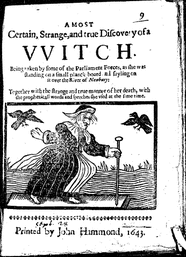 Even though "Halloween" wasn't celebrated in early modern England, witches of course could be found. You only had to seek out the saddest, most down-trodden, marginalized woman in the community, and voila! you'd find your witch. All the better if she were sickly in body or mind, and had no one to protect her. And you could have turned her over to the authorities, and see if she could prove her innocence. (Will she sink or float when tossed in water? Remember, the godly will sink! Does she have Devil's marks--extra nipples--or odd shaped birthmarks? Could she recite the Lord's Prayer without stumbling?) 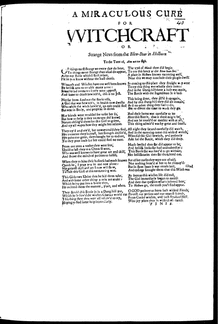 1670 Tract Supplement / A8:1[40] OR... you could have just taken matters into your own hands, and rid the afflicted of the curse. By thwarting the witch, she'll lose her power and die. So if you--or any of your friends--had become cursed, here is what you would have needed to do: Get a bottle of urine from the accursed. Bury the bottle in a dung-hill. Keep careful watch. The witch will be drawn to the dung-hill and will demand the bottle. No matter how she pleads and curses, you can not give her the bottle. Eventually she will die, thus breaking the curse. So simple to get rid of a witch, right? Sure. But of course, the trials weren't about stopping her powers, at least not the supernatural kind. They were about asserting moral and patriarchal authority, and no amount of urine buried in dung would bring about the same ends. Just something to consider this Halloween! 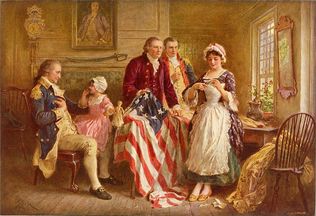 Betsy Ross, 1777 (Ferris, ca 1920) Growing up in Philadelphia, I was both immersed in and oblivious to the colonial history that surrounded me. After school my friends and I often went to the mall by the Liberty Bell or we hung out in beautiful Independence Square, within a few yards of where the Declaration of Independence was signed, rarely heeding the significance of our historic surroundings. I admit, sometimes we'd laugh at the tourists snapping countless pictures, reading signs, peering at maps, buying outrageously expensive soft pretzels (everyone knew you don't buy them in the tourist areas!), pitching pennies on Ben Franklin's grave (years later, I understood why they did that--they were paying homage to the man who coined the phrase in his Poor Richard's Almanac, "A penny saved is a penny earned"--but at the time we thought it was a pretty silly thing to do.) Hey, we were kids. But I'm sure if someone had asked, we'd have been able to give a decent enough explanation of the events leading to the break with Great Britain, maybe something about John Hancock and Thomas Jefferson, etc. Heck, I'm sure we could have offered up the great tale of how Betsy Ross was asked by none other than George Washington himself to create the first American flag. And how that flag she sewed, with its unique star pattern, helped inspire a burgeoning nation to independence and unity. Or something along those lines. You don't mess with Betsy Ross. But as a historian now, I look back and question how history and legend became intertwined with our local popular memory and national identity. Only a little digging reveals that few vexillogists (people who collect and study flags, and also my new favorite word) and historians agree with the popular conviction that Philadelphia seamstress Elisabeth Griscom Ross (a.k.a. Betsy Ross, revered national icon) actually made that first flag (let alone that General Washington commissioned it). Indeed, the evidence appears to be scant one way or the other, and heavily anecdotal in nature. Much of the sentimental legend appears to have derived from a popular account put forth by Ross's daughter, and related in full by her grandson, in the late nineteenth century. Even then, however, scholars seemed a bit skeptical about the veracity of the legend, but the romantic quality seems to have captured the imagination of Ross's biographers, and the legend somehow became true. (Noted historian Laurel Ulrich offers an excellent discussion of how this transpired, and why Betsy Ross is still an important figure in U.S. history).  Another vexillogy related point (and yes, I am hoping to use that word repeatedly)--is the so-called "Betsy Ross five-pointed star pattern." Again, all kinds of myths abound about the origins of this type of star: some argue that the stars were connected to George Washington's family crest (doubtful, despite the red stars on the crest, given that this was the same man who would not be king); or perhaps to European heraldry (maybe some influences here), or most likely to the early naval signs. Say what you will--my money is on the alleged connection of the early founding fathers to the Masonic order (supposedly stars were one of their symbols, along with pyramids etc. The Da Vinci Code in America, anyone?) Even though legends about Betsy Ross and the flag are enjoyable, I think it's important to consider their origins. But what do you think?  who are these people anyway One of my favorite past-times is to imagine back stories for the people I see at coffee shops, parks, airports, you name it. I'm always speculating about their personal lives, the secrets they keep, their ambitions--either thwarted or realized. I also like to imagine people in completely different historical contexts. I never make them actual known historical figures, but I might connect them with someone famous. For example, I often look at my eighteen-year old students as World War I soldiers, or the people sipping wine as Macedonians, or the woman strolling down the street as a Druid priestess (not really sure what that looks like though) or the person who cut me off a French aristocrat (sorry about your impending beheading...) One of my friends for sure would be a disguised Han warrior, making tea for her family, then sneaking off to fight the Huns. (Or am I thinking of Mulan?) Another friend would have been an early suffragette, and still another, a village chieftain. A professor I know would have been an Abbott, living a scholarly life in a monastery. And so on. I always imagine my husband as a Viking ship-maker or one of Charlemagne's armor-makers. I wouldn't have met him, unfortunately, as I'd have been a servant in some great English manor or maybe teaching in a one-room schoolhouse on the prairie. Or taking bribes as a Chicago gumshoe. Something like that. A girl can dream. It's fun to speculate what we might have been like 50, 100, 1000, 2000, 10000 years ago! (Cave-man anyone?) Or for that matter, if we lived 5000 years in the future. What about you? How would you imagine yourself in a different time period? 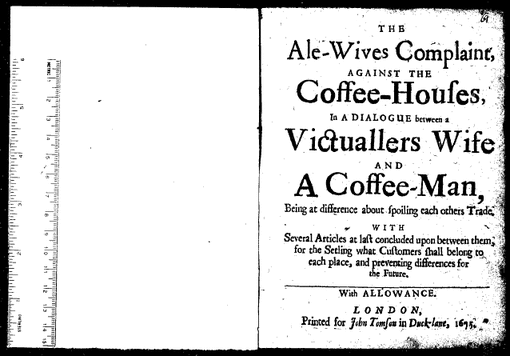 (1675) Wing / 1298:09 O Oh Ale-Wife! Oh, Coffee-Man! Can't we all get along? I promise, I'll divide my time among your fine establishments!
I'll be taking a short break from writing my blog for a while, well, to get some writing done. I'm about halfway finished my copy edits for A Murder at Rosamund's Gate. I'll also be working on the second draft of From the Charred Remains soon, gnashing my teeth over the feedback from my alpha reader. In the mean time, I'll leave you to contemplate how the ale-wife and coffee-man, long embroiled in cantankerous railing (stealing each others' customers!), came to enter a "friendly consultation." The ale-wife promised that "any person being reelingly drunk may be entertained in a coffee-house to make himself sober..." (Essentially, she promised to get her customers as drunk as possible and send them over to the Coffee-House, to improve the coffee man's coffee sales.) Similarly, the Coffee-Man agreed to send any of his customers who were tired of "superior speech" and "prittle prattle" over to the Ale-House. This way, they could get on with the business of "honest drinking." See, everyone wins! All this to say, if you need me, I'll be at the coffee house. Or at a tavern. Or on a seventeenth-century walkabout. (Okay, maybe grading papers. Maybe doing my day job.) Certainly writing. But I won't be on my blog. At least, not for a few weeks. Cheers! 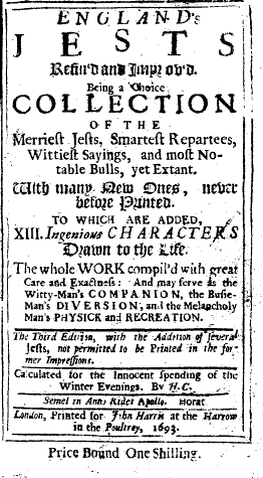 So if you're at that seventeenth-century dinner party that I mentioned in my last post, you'll want a few "merry jests, smart repartees, witty sayings, and a few notable bulls" to amuse and delight your friends (that is, if you want to transcend urine tricks and flatulence). (Not jokes though--apparently the word joque, from the Latin iocus "jest, sport, pastime'--had only just emerged in England in the 1660s, and was only just entering the seventeenth-century vernacular.) This particular jest-book, Humphrey Crouch's England's Jests Refin'd and Improved (1693), one of England's first such collections, offers equal opportunity digs at all manner of people: gentry, magistrates, royals, Quakers, Catholics, priests, Jews, foreigners, scholars, students, old people, young people, pregnant women, scolds, rakes, brothel-keepers, cuckolded husbands, criminals awaiting execution--you name it. Many jests were political or religious in nature but, as you might imagine, such humor doesn't always translate easily across three centuries (and English doesn't always translate to American. HA!) However, this one just amuses me. "A witty young fellow was try'd for his life, since his Majesties Restoration. And being caught, they told him he must be hang'd: But he pleaded in his own defence a long time; at last desir'd the Judge, That if he must be hang'd, he might be hanged after the new way that Oliver was, three or four years after he was dead." (The corpse of the Lord Protector Oliver Cromwell had been dug up and hanged posthumously two years after Charles II was restored to the English throne. Yup, as gross as it sounds.) And, I could skip the obligatory lawyer jest but I won't. "A certain person speaking unseemly words before a Gentlewoman, she ask'd him what profession he was of. Madam, says he, I am a civil lawyer. Alas, Sir, she replied, If Civil lawyers are such rude people, I wonder what other Lawyers are." Mwah ha ha! Civil lawyers. (Okay, fine. Maybe not that funny) Of course, I imagine bawdy humor will still translate best.... "Two friends meeting, one being overjoyed to see the other. Hark you Sir, said he, Between you and I, my wife's with child. Faith, cry'd the other, you're a liar, for I have not seen her this twelve months." (Awk-ward!) "A young woman, having married a great student, who was so intent on his studies, that she thought herself too little regarded by him, and one day when they were at Dinner with some Friends, she wished herself a book, that she may have more of her Husband's company. If it must be so, says her husband, I wish thou wert an Almanack, that I might change thee for a new one once a year." (Ouch!) 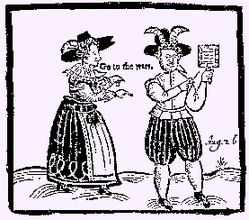 the witless cuckolded husband (with horns!) "One that had only been married but a week called her husband a 'cuckold,' which her mother hearing, reproved her: You slut, says she, do you call your husband cuckold already?And I have been married this twenty years to your father, and never darest tell him of it yet!" (Ah, the old cuckolded husband jest). So you tell me...how would this jest end? A cuckold, a magistrate, and a Puritan walk into a tavern... 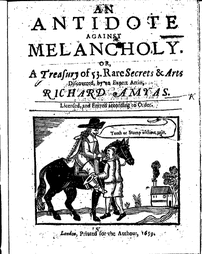 Rare hosting tips! (Wing A3032A ) Hosting a dinner party? Why not try these fun seventeenth-century tips... Richard Amyas has 53 in his treasury, I'll give you ten.. First, you'll want to make your house ready for your guests: 1. Make Rats forsake a House: Burn Assafettida in the Roof of the House often, and the Rats will forsake and fly from the House in a short time. (Assafettida, also known as "devil's dung, tastes like leeks. Apparently. Someone can let me know). 2. Make a Light that will continue always: Take the Liquor of Glow-worms, mix it with a quarter of the quantity of quick|silver, and put it into a Vi[...]l, hang it up in the Room, and you may see all night long by the light. (Nifty, if you've got lots of glow-worms on hand!) 3. Catch Fleas in a trap: Take a piece of Tin made like a dripping-pan, the length and bigness of a small trencher, then put over it 5 or 6 small wires made fast to the Tin, bowed like the hoops over a waggon, then fill the Tin with Venice Turpentine mixt with a little honey, then put this Trap in the Bed in the morning when you rise, between the sheets, and there you shall find the Fleas stick in the Turpentine, as thick as Wasps in a Honey-pot. (Alrightee then!) Why not try these parlour--ahem, withdrawing room--tricks? Wow and amaze your guests!!! 4. Write your name on a piece of Paper, and burn that piece of Paper & the same letters to appear on the back of your hand. (Got that?) To do this, first write the Name on a small piece of Paper; then privately write the same Letters on the back of your hand, with a Pen-ful of your own Urine, which none can perceive: then burn that Paper· and as it is almost burnt, clap it upon the back of your hand, and rub it, & there will strangely appear the same letters on the back of your hand, with admiration to the Beholders. (Ah, the secret hidden urine trick. Classic!) 5. Make Pease leap out of the pot as if they were mad. Put a Quill or two of Quick-Silver into the pot, and all the Pease shall leap out of the pot. (Well, now that just sounds fun!) (They're seem to be a number of related tricks like this: To make a blown Bladder dance and skip about the room; to make a penny-loaf tumble, and skip up and down on it self; to make a ring dance on a table of it self...Basically, just add quicksilver to anything, and the object will look mad!!! A handy substance, to be sure!) 6. Make an Apple to move on a Table of it self: A fine secret. (and guess what, no quick silver!) Cut an Apple in the midst, and in the one half make a round hole, putting therein a black Beetle, and so lay the half on the table, and it will move about the table. 7. Make a Chamber to appear full of Addors and Snakes. (Now THAT'S got to be a parlor trick you don't see every day!) Kill a dozen Adders and Snakes, and take the oyl of them, and mix it with wax, and make a Candle, light it in a Chamber where rushes are, and the rushes will appear to be Adders and Snakes about the Room. (Somehow I feel there's a corollary woodcut somewhere--how to trick your friends into being bitten by a poisonous snake by letting them think they are preparing a neat trick themselves...) And at the end of the night, if your guests aren't bidding timely farewells... 8. Fright the people of a house, and make them believe there are Spirits walking in a Room. To do this, take a black or gray Cat; then take 4. Walnut-shells, put Pitch in them, beat it, and put on every foot one; and tye a certain piece of rotten wood, which you shall find to shine in a dark night about the Cats Neck, and put her in a boarded Room, she will so trample about the Room, to the amazement of them that know not what you have done; and the moist piece of rotten wood (if they peep in at the key|hole, or chink of the door) it will seem to be like fire. And if the scare-the-bejezus-out-of-your-guests doesn't work... 9. Clear a Room of drunken or rude company. Take a Chafingdish of clear Charcoals, or live Wood-coals; throw Giney Pepper on it, and put it under the table, and they will both cough, sneez, fart, and spew, if they have drunk hard. (What can I say? What can I say?) And to make sure everyone thinks your party was a success (even if it wasn't)... 10. Make a Tell-tale or Gossip, to trump about: the house an hour or two shooting off the great Guns. Take the Liver of a Hare dryed in an Oven, and made into fine Powder; mix it with the Eggs of yellow Ants, or Pismires, put it into the Parties broth, or into Beer with Sugar and Nutmeg to discolour it: then an hour after employ the party to draw off a straight pair of Boots, or the like Exercise, and he'l make cracking off about bravely. (Okay, I have to admit, I'm not sure I understand this one. I think this mixture will make people think they've been to the coolest party ever...) And just think--Amyas had 43 more of these gems! Who wouldn't want to party 1659-style? |
Susanna CalkinsHistorian. Mystery writer. Researcher. Teacher. Occasional blogger. Categories
All
Archives
May 2023
|
 RSS Feed
RSS Feed